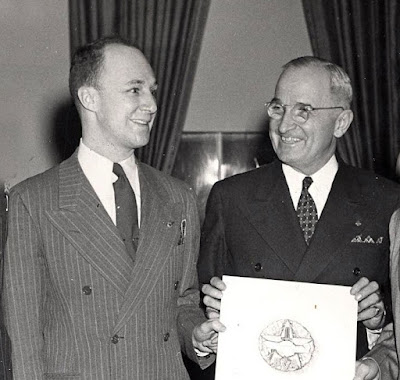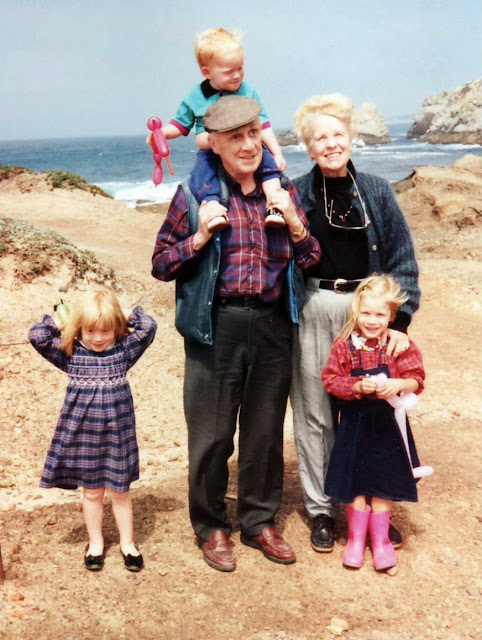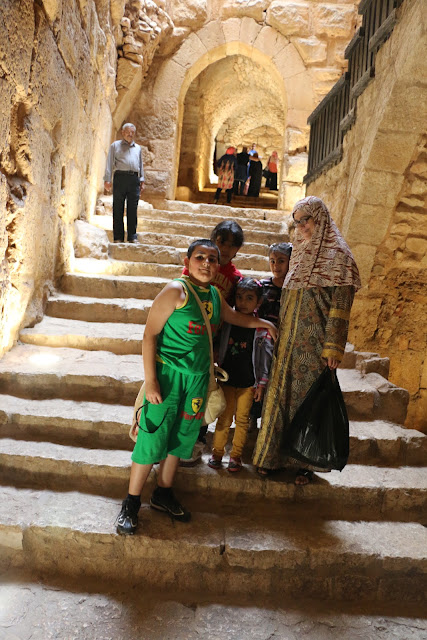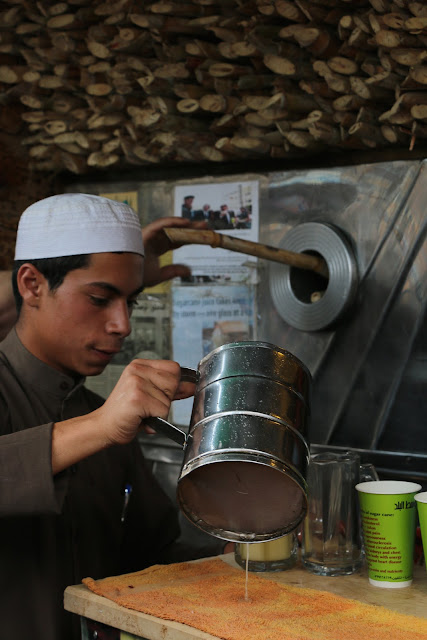 |
| On top of Mt. Nebo, with Jerusalem, the Dead Sea, and the Jordan Valley behind us. |
On our recent trip to Jordan, my most stirring moment was to stand on top of Mt. Nebo, the mountain where Moses gazed out to see the Promised Land. Looking out onto the wide valley below, it felt like an end of a chapter because we, like Moses, were not allowed to go much further since we were on the border of two countries. From the view on top of the mountain, you can see the Dead Sea to the south, the rich Jordan Valley, the ancient/ modern cities of Jericho and Hebron, and the mountains on the other side with Bethlehem, Ramallah, and Jerusalem in silhouette. (Deuteronomy 34: 1-4)
As I stood alone on the mountain with my family, I felt like I knew Moses a little better, a would be Egyptian prince who reluctantly, meekly took on the challenge of bringing his people across the Red Sea to the Promised Land. He unknowingly began a journey that would last 40 years in remote, arid deserts. Mt. Nebo would be his final steps, before he would bid farewell to the people he had mentored and led across innumerable deserts and valleys.
As I looked at the view behind us and imagined the 40 years of toil, hardship, and hopefully some merriment in those paths, I was struck with his imponderable courage and faith. The wilderness behind me showed no signs of water supplies, and the thought of leading a thirsty, famished, exhausted, and sometimes cantankerous group of people (a few million strong) defies my imagination. Furthermore, Moses clearly knew his shortcomings and weaknesses, and I am certain he often doubted his abilities, but he maintained his belief and the remembrance of God's promise to him:
"And Moses said unto the Lord, O my Lord, I am not eloquent, neither heretofore, nor since thou hast spoken unto thy servant: but I am slow of speech, and of a slow tongue. And the Lord said unto him, 'Who hast made man's mouth? Or who maketh the dumb, or deaf, or the seeing, or the blind, have not I the Lord? Now therefore go, and I will be with thy mouth and teach thee what thou shalt say.'" (Exodus 4:10-12)
Despite the seemingly impossible, Moses tackled the job anyways. And for this reason, three major religions of the world esteem and revere him as a mighty prophet who performed miracles and brought about much good and deliverance--in a barren, forsaken place. Although he never entered the Promised Land, he rescued and shepherded many peoples so they could flourish someday. He nourished the belief that he was making others' lives better--even though he would never come down Mt. Nebo to cross the River Jordan.
 |
|
As I looked across to Jerusalem, a place where I have visited and lived, my heart yearned for the peace of this land, this vast region of the world that has enveloped my heart for decades. Several times while in Jordan, I heard Jordanians call people on the other side of the border in Palestine, their "cousins." In the Quran, it states about Moses, "He told the Israelites that he had been chosen as the messenger; God had said unto him, Oh Moses! I have chosen you in preference to others, and have entrusted you with the mission to convey my words as contained in my revelations to all the people.... " (Quran 7:144)
Coming to Jordan reminded me of a favorite scripture from Psalms 122:6, "Pray for the peace of Jerusalem: they shall prosper that love thee." It is interesting that Jerusalem means a place of peace, 'Shalom' means peace in Hebrew, and 'Salam' also means peace in Arabic. I do not think it is any coincidence. As I looked out on the windy crest of the mountain, I felt "the geography of hope," a term that Wallace Stegner, the American author, coined--meaning that a terrain of land can inspire hope and promise. I believe that eventually all the cousins will live in peace. I am sure Moses, the great prophet of the three main religions in Jerusalem, loved them all.
A few lessons of my year following Moses:
1) Take the first step into the unknown, and keep walking. Miracles will happen, and people, known and unknown, will come to your rescue. But just keep walking, even if the waters get deep. You will get to the other side of the shore.
2) As individuals, we are unique, and therefore, can never be duplicated. However, our jobs and purposes are not indispensable. Other people can be delegated to do the things we cannot do. There will be people like Joshua, who will come after us. We are all born into a story, a cast of characters, and the story will continue, going forward. We must prepare for the people in our story who are ahead of us--making their lives more enriched, safe, and happy.
3) Moses overcame his feelings of inadequacy and disbelief that he could accomplish difficult feats. He remembered his faith, the people who had mentored and taught him, and then trudged on.
4) I am sure Moses climbed a mountain periodically to have a retreat from all the recalcitrant people he was leading. It was a hefty load to hear all those pleas and needs. But I am sure he loved them anyways or he would have left the trail 39 years earlier....
Following the footsteps of Moses this year with our family--from Egypt, on the shores of the Red Sea, to the wilderness in Jordan (I have been up to Mt. Sinai when I was 20), to Mt. Nebo:
 |
| Last October on the shores of the Red Sea in Egypt |
 |
| I took this picture of my three boys last October in the Red Sea. You could faintly see the Sinai in the background that day as they walked, swam toward it. The wide expansiveness of the Red Sea on that day reminded us of Moses' great miracle of separating the waters so the Israelites could get to safety. |
 |
| On the shores of the Egyptian side of the Red Sea. |
 |
On top of Mt. Nebo
 |
| The valley that is located near Madaba, Jordan--before ascending to Mt. Nebo. |
 |
| A scene from behind the mountain, where Bedouin shepherds herded their sheep in Jordan. |
|
 |
| Peter having a reflective moment on top of Mt. Nebo, looking out from Hebron to the Jordan Valley. |
 |
Some pilgrims from India on top of Mt. Nebo who are about to begin mass.
|

















